“This class will change your life.” I will never forget these words Dr. Michelle Stecker, my professor for “Introduction to Social Entrepreneurship,” said on the first day of class. 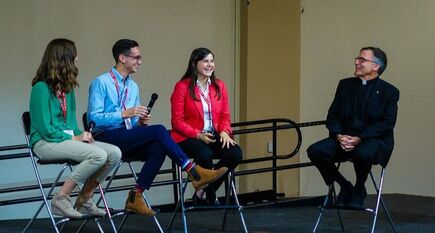 I was captivated by the boldness of her statement, but also by her unwavering certainty. After ten weeks, I had fallen in love with the model of social entrepreneurship, but it wasn’t until I got to live into that model as a Global Social Benefit Fellow that her words became the reality of my heart: Social entrepreneurship has changed my life.
I was captivated by the boldness of her statement, but also by her unwavering certainty. After ten weeks, I had fallen in love with the model of social entrepreneurship, but it wasn’t until I got to live into that model as a Global Social Benefit Fellow that her words became the reality of my heart: Social entrepreneurship has changed my life.
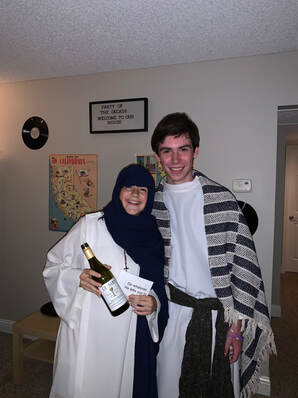
I thought I knew the extent of that transformation after completing her class. Despite studying bioengineering, whenever someone asked me what I wanted to do whenever I graduated, I always responded, “I want to be a social entrepreneur.” My mind was constantly imagining ways that social entrepreneurship could transform the social justice issues present in our world today, and my heart so desired to be part of that transformation. I was so confident that this is the pathway that God was inviting me towards, and like Mary, the Mother of God, I wanted to freely say “yes” to His will.
While this excitement was so prevalent, the deepest parts of my heart were also saddened. Ever since high school, I had secretly been imagining my life as a Catholic Sister. I was constantly researching religious congregations behind the closed doors of my room, knowing that my heart longed so greatly to be the bride of Christ. However, after this desire for social entrepreneurship became implanted on my heart, I truly felt it was God’s desire. Therefore, for the time being, I had to say no to my desire to enter into religious life. While it was hard to do, the excitement for social entrepreneurship filled me with a tremendous amount of joy.
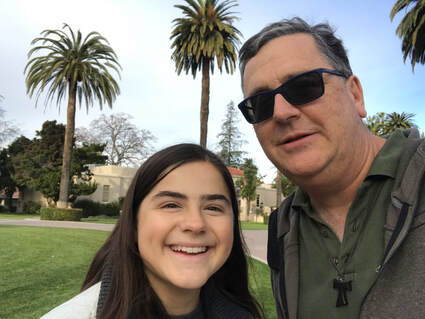
It wasn’t until I went on a walk with the director of the Global Social Benefit Fellowship, Br. Keith Warner OFM, that my eyes were once again opened to the possibility of religious life. I discussed my conflicting desires to enter into religious life, yet also be a social entrepreneur, and he said five simple words to me: Why can’t you do both? This idea shocked me, for I saw Catholic Sisters as women that taught at Catholic Schools or ran homeless shelters, but not women who were using social entrepreneurship models to create sustainable change. However, as Keith began to explain a new partnership that Miller Center was forming with a group of 300 Catholic congregations in Africa, I realized that while it was remarkably new, it wasn’t just a fantasy.
While this news was incredibly exciting, what he further said captivated my attention even more: there was a possibility that there would be a fellowship placement (Eggpreneur) that would work with Catholic Sisters that summer. Even the thought of that possibility filled my heart with a tremendous amount of joy. I felt God was giving me an opportunity to incorporate these two desires of mine into one, instead of choosing one or the other.
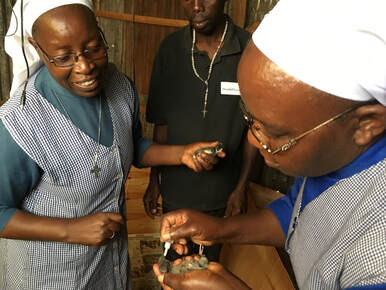
The desire to integrate social entrepreneurship with religious life never left me as I applied and was selected to be a Global Social Benefit Fellow. As part of our action research plan (written prior to leaving for Kenya), there was one section that addressed our goals for vocational discernment in which I wrote:
“Through the research I will conduct this summer with Eggpreneur and the Assumption Sisters of Eldoret, I will have the opportunity to see the intersection of these two passions of mine. This will give me a glimpse of both of these lifestyles independently, but also in connection with each other. Furthermore, this summer I hope to spend time in prayer and reflection, discerning these paths and opening my heart to wherever God may be inviting me next.”
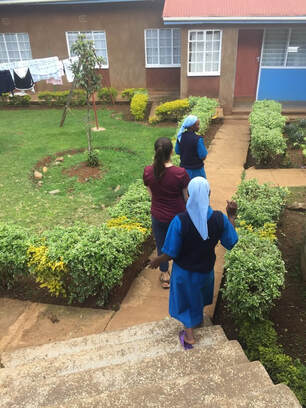
While I wrote these words honestly, I never realized how my experience in Kenya would play a major role in my vocational discernment. God was revealing his desires for me during many moments in Kenya, but they were most deeply manifested when living with the Assumption Sisters of Eldoret and in conducting interviews with women in Machakos (near the Eggpreneur farm).
In living with the Catholic Sisters, it was not long before they started calling me an Aspirant (someone who is discerning entering into their congregation). While I wasn’t necessarily drawn to their congregation, I knew that my heart did desire religious life, so I never denied it. I initially only attended daily mass, but as my heart felt more drawn to their community, I asked to participate more and more in their daily prayers, which they openly accepted. Not only did my heart come alive in living with them, but I felt a tremendous amount of peace.
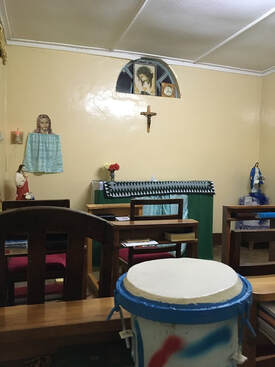
Before leaving for college, the Deacon of my home parish told me, “Go where your heart finds peace,” so this recognition of peace impelled me to understand where this peace was coming from. Did it come from praying with the Sisters, living in community, or in conducting action research with Eggpreneur? (Or was I overthinking the entire situation, which I often tend to do?)
In trying to answer this question, I spent additional time praying alone in their chapel, gazing upon the face of Jesus that was conveniently placed over the tabernacle (where the Body of Christ is stored). It was there that for one of the first times, I felt that God was desiring for me to enter into religious life, and it wasn’t only my desire. While this more serious discernment of entering into religious life was realized in prayer, additional components of my vocational discernment were manifested in the research Avery and I were conducting with Eggpreneur.
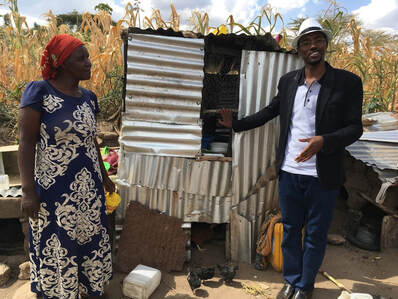
I remember one particular day, we were going to conduct an interview with a woman who with the help and support of Eggpreneur, was raising chickens. Matt (the founder of Eggpreneur) mentioned that she was very poor, but that statement didn’t hit me until we walked onto the premise of her land. Many children and grandchildren ran around barefoot with tattered clothes playing with a ball of rolled up trash. I remember asking the mother the question, “How has Eggpreneur impacted your life?” For many previous women, they had responded with answers such as, “I can now send my kids to school” or “I used the money to get electricity.” However, as this mother looked around her field of dead corn, she said, “I can finally buy enough food to feed all of my children and grandchildren.” This answer was both deeply heart-wrenching (that families had to live in these circumstances), but also incredibly uplifting. In that moment, I finally recognized the impact that social entrepreneurship, particularly Eggpreneur, could have on a woman and her family. Not only did her family now have food on the table, but because it was a sustainable solution, it also provided a sense of hope.
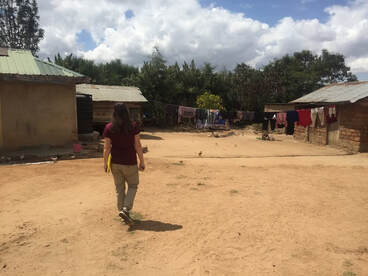
While the interview was deeply moving, it was in seeing one of her children, a young man who was unable to walk or talk, that captivated my heart. As soon as the interview was over, I raced over to him, kneeled on the mat he was laying on, and grabbed his hand. His name was Francis, and although we exchanged no words, I felt so connected to him. In this short, yet profound experience, I felt I was kneeling next to Christ himself. In remembering Francis, I am constantly reminded that it is to the most marginalized that my heart longs to be with.
These insights and experiences in Kenya have played a major role in my vocational discernment, but the true transformation didn’t occur until I returned to the United States. For it was only in returning that I had the time to process my thoughts and experiences, and more importantly, to act on them. I could no longer just imagine my future, but I needed to take tangible steps to see my future realized!
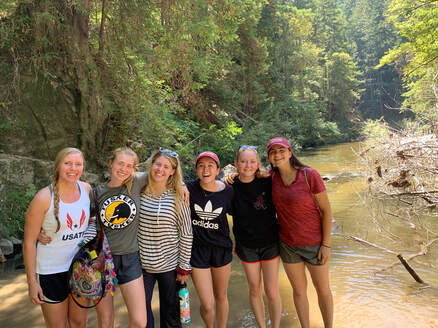
Fortunately, I was not on this path alone. Not only was I walking alongside seventeen other remarkable Fellows, but I was guided by three incredible instructors who were completely invested in helping us explore the opportunities for our future. This included connecting us with professionals in our respective fields, providing reading material that addressed the vocational discernment process, and meeting with us individually to discuss more of our hopes for our future. While many individuals often apply to the fellowship for the opportunity to spend eight weeks in a foreign country providing real value to a social enterprise, the two months of vocational discernment after returning from the field are as impactful, if not more impactful, than the experience itself.
While I knew I was embarking on this journey with others, I still felt incredibly alone. I wanted to respond to God’s invitation to further discern the religious life, but this was a path that very few pursued. When I would mention to others I was studying bioengineering, their eyes would turn towards me, but when I further discussed that I was pursuing religious life, they often looked away. It wasn’t that they were necessarily disappointed with my decision, but they often were confused about what religious life entailed, and how that had anything to do with my four years of engineering education.
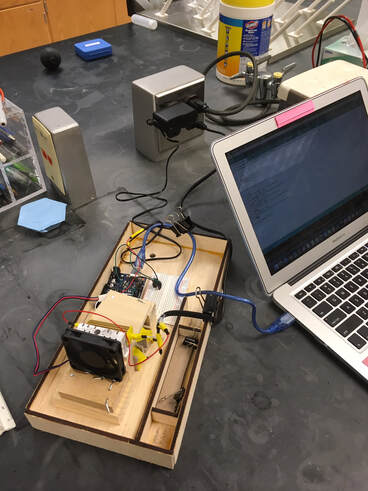
To a very large degree, I understood them, because I felt it myself. It would make sense if I had lost interest in bioengineering, and so this was an alternative option, but throughout my undergraduate experience, I had fallen even more in love with what I was studying. In the same way, I also felt torn with my passion for social entrepreneurship. Indeed I had spent a summer working at the intersection of religious life and a social enterprise, so I knew it was possible, but ultimately, I knew that in committing my life to a congregation, I was also accepting a vow of obedience. This vow didn’t exclude my passions or dreams, but I knew at the end of the day, I wouldn’t be making the final decision.
These thoughts continued to flood my mind, but I still felt an incredible amount of peace and joy–a greater peace and joy than I had ever experienced in my life. It became ever more clear that this is truly what God was desiring for me, and so I knew I had to dive deeper into this reality.
A great sense of consolation came over me when sharing my experience with a prospective Fellow. She asked me how I incorporated my engineering skills into my role working with Eggpreneur over the summer. The words easily came off my tongue: “I have found that engineering is all about thinking critically about how to create innovative solutions to problems. Sure, I wasn’t in the lab performing a serial dilution or culturing cells, but nonetheless, I was using my engineering mindset every day in the field.” It was then, in saying those words, that I recognized what I was saying. Even though the fellowship wasn’t a “bioengineering fellowship,” I was still able to apply many of the skills I had learned in my engineering classes to find an answer to our overall research question. In the same way, even if the words “bioengineer” or “social entrepreneur” aren’t in the title of my role in a religious congregation, that doesn’t mean that the skills that I have learned in those disciplines will simply disappear.
While this may seem like a minor realization, it meant a tremendous amount to me. For one of the first times, I didn’t feel that “yes” to religious life was saying “no” to engineering or social entrepreneurship. Rather, I was saying “yes” to all possibilities, recognizing that the skills and experiences that I have gained from these disciplines will continue to remain with me. Jeff Miller, a generous donor of Miller Center, mentioned this when talking with our class after returning from our summer placements, but only when I realized what I was saying myself, was I able to truly understand the extent of its implications.
As to what lies ahead, that is up to God to decide. While I currently feel called to enter into a religious congregation, I am always open to new or additional plans that God has in store. I recognized this summer that as much as I desire to imagine the end product when I am in the process of creating it, I have learned that it is often better to simply trust the process. The process may take me through windy African hills or across barren corn fields, but if God is with me, I can desire nothing more.

